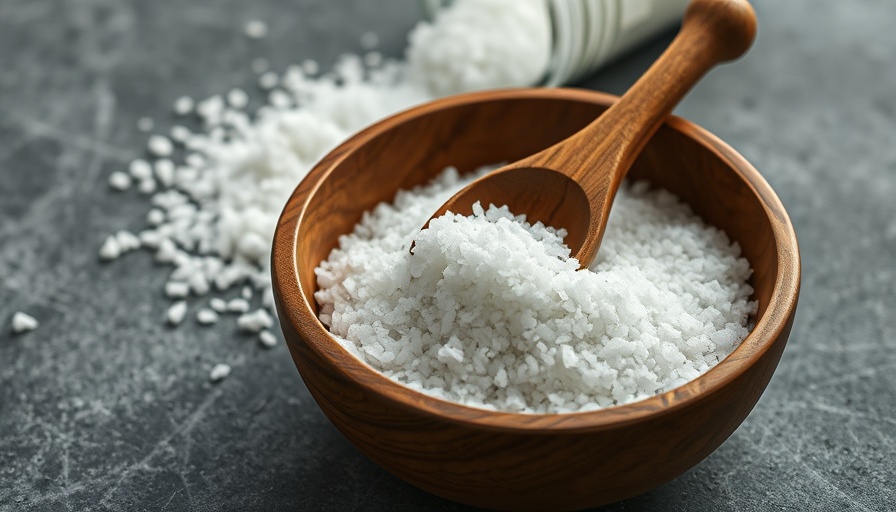
Understanding Sodium: The Essential yet Dangerous Mineral
Sodium, more commonly known as salt, is indispensable in enhancing flavor and preserving food. However, the excessive consumption of sodium raises continuous concerns among health professionals. While salt is made up of 40% sodium and 60% chloride, it's the sodium part that is often associated with serious health issues. According to the Harvard School of Public Health, managing sodium consumption is vital for maintaining overall health, preventing diseases, and enhancing quality of life.
The Alarming Statistics Behind Sodium Intake
In India, the average daily salt intake is alarmingly higher than the World Health Organization's recommended limit of 5 grams per day. The Indian Council of Medical Research (ICMR) and its "One Pinch of Salt" campaign highlight that this trend is contributing to dire health consequences, with sodium-related issues leading to approximately 1.89 million deaths annually. This significant statistic underscores the need for immediate action and awareness regarding sodium intake and its consequences.
The Silent Health Risks of Excess Sodium
Sodium isn’t just a seasoning on your table—it's a potential health risk. Excessive sodium consumption can lead to numerous health complications:
- Hypertension: Increased sodium levels cause water retention in the body, leading to elevated blood volume and chronic pressure on blood vessels, resulting in hypertension.
- Heart Disease: Long-term high blood pressure can damage your heart, stiffening blood vessels and elevating the risk of heart attacks and heart failure.
- Stroke Risks: The damage done to blood vessels heightens the likelihood of stroke, which can lead to serious disabilities or death.
- Kidney Damage: Excess sodium can strain the kidneys, resulting in kidney function impairment and potentially leading to renal failure.
Nutritionist Anshul Jaibharat emphasizes, “These effects are interconnected; elevated sodium levels significantly impact heart health, brain function, and renal function.” Being aware of these chronic health risks helps us make informed dietary choices.
Simple Strategies to Manage Sodium Intake
Are you looking to improve your health while still enjoying delicious meals? Here are several easy strategies to control your sodium consumption:
- Switch to Low-Sodium Salt: By opting for low-sodium alternatives that contain around 15% less sodium, you can flavor your food while lowering sodium intake. Many low-sodium salts are inclusive of potassium, which helps reduce blood pressure.
- Cook with Fresh Ingredients: Embrace whole foods like fruits, vegetables, and lean proteins that naturally possess lower sodium levels. Utilizing herbs and spices instead of salt can elevate food flavors without risk.
- Change Your Dinner Table Habits: If reaching for the salt shaker has become second nature at the dinner table, it's time to reconsider this habit. Instead, focus on enhancing your meals with fond memories of family cooking or experiment with new flavors, steering away from excessive salt.
- Read Food Labels Carefully: It's crucial to understand that many processed foods contain hidden sodium. Make it a habit to examine food labels to ensure you’re not exceeding your sodium limits unknowingly.
- Consult with Nutritionists: If unsure about your sodium intake or dietary choices, consulting with professionals can provide personalized guidance based on individual health needs.
Making Informed Nutritional Choices
Making informed dietary choices is not just about cutting back on sodium. It’s imperative to foster a balanced approach to nutrition. A well-rounded diet filled with a variety of nutrients will yield better overall health. Opt for fruits, vegetables, lean proteins, and whole grains while being mindful of sodium levels.
Your health is a priority; managing sodium intake through better choices is a significant step toward improved wellbeing. Remember to monitor your habits and gradually incorporate these practices into your lifestyle for sustainable health improvements.
Conclusion: Take Charge of Your Health Today!
Preventive measures to manage sodium intake are made easier with knowledge. By understanding sodium’s impacts and implementing these strategies, you can foster not just better heart health but overall well-being. Are you ready to make those sustainable changes? Start today by taking small, manageable steps toward a healthier you—and don’t forget to share your journey with family and friends!
 Add Row
Add Row  Add
Add 




Write A Comment